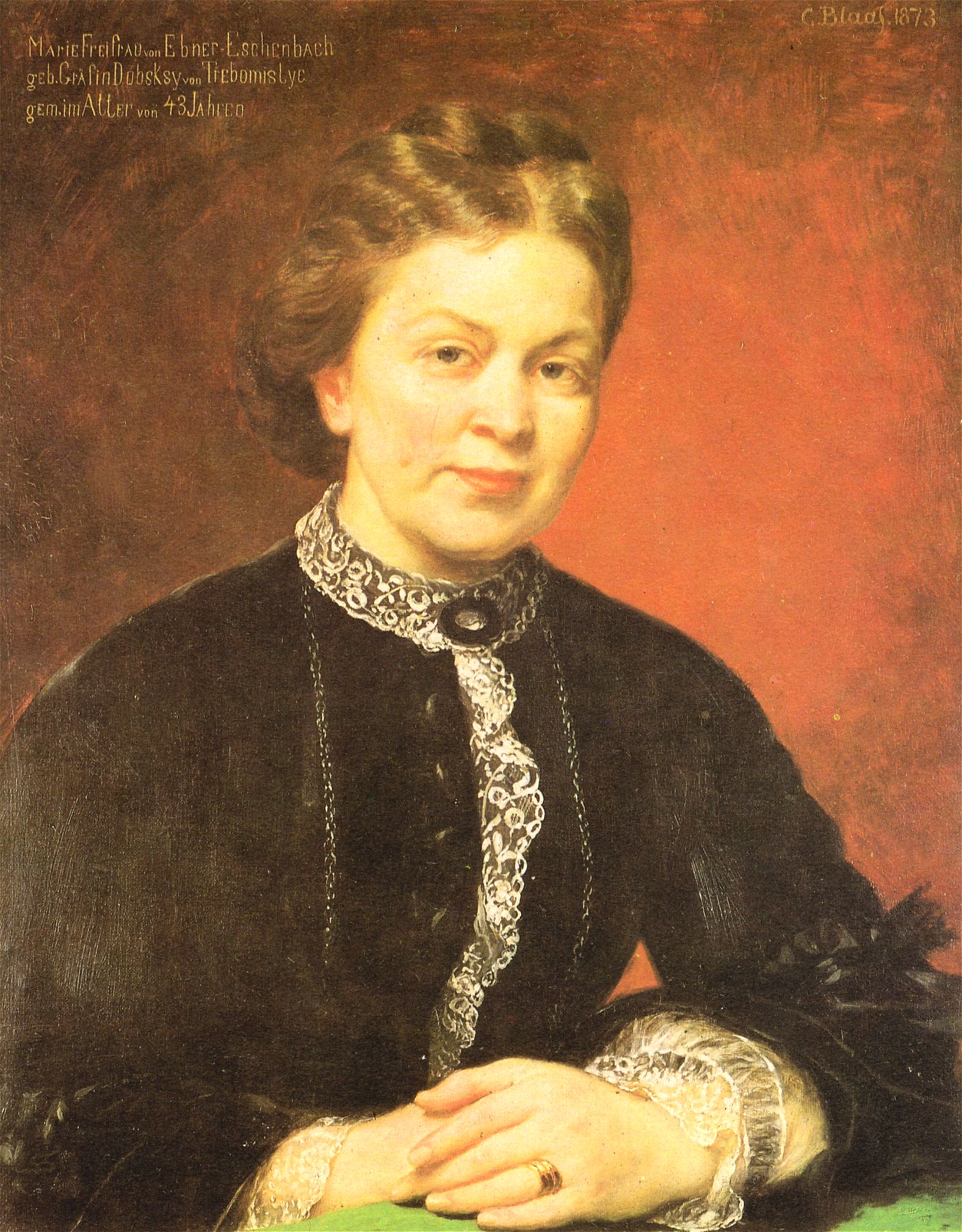“Chance is necessity hidden behind a veil.”
Der Zufall ist die in Schleier gehüllte Notwendigkeit.
Source: Aphorisms (1880/1893), p. 20.
Marie Freifrau Ebner von Eschenbach, née baronne Dubský le 13 septembre 1830 à Troubky-Zdislavice et morte le 12 mars 1916 à Vienne, est une écrivain autrichienne. Wikipedia

“Chance is necessity hidden behind a veil.”
Der Zufall ist die in Schleier gehüllte Notwendigkeit.
Source: Aphorisms (1880/1893), p. 20.
Wenn Du durchaus nur die Wahl hast, zwischen einer Unwahrheit und einer Grobheit, dann wähle die Grobheit. Wenn jedoch die Wahl getroffen werden muß zwischen einer Unwahrheit und einer Grausamkeit, dann wähle die Unwahrheit.
Source: Aphorisms (1880/1893), p. 39.
Der eitle, schwache Mensch sieht in Jedem einen Richter, der stolze, starke hat keinen Richter als sich selbst.
Source: Aphorisms (1880/1893), p. 34.
“There are very few honest friends—the demand is not particularly great.”
Es gibt wenig aufrichtige Freunde. Die Nachfrage ist auch gering.
Source: Aphorisms (1880/1893), p. 71.
“Nothing is so often and so irrevocably missed as the opportunity which crops up daily.”
Nichts wird so oft unwiederbringlich versäumt wie eine Gelegenheit, die sich täglich bietet.
Source: Aphorisms (1880/1893), p. 21.
“If art finds the temple closed, then it flees into the workshop.”
Wenn der Kunst kein Tempel mehr offen steht, dann flüchtet sie in die Werkstatt.
Source: Aphorisms (1880/1893), p. 24.
Es gibt eine Menge kleiner Rücksichtslosigkeiten und Unarten, die an und für sich nichts bedeuten, aber furchtbar sind als Kennzeichen der Beschaffenheit der Seele.
Source: Aphorisms (1880/1893), p. 38.
“Those who trusted at the wrong time and place will in turn mistrust at the wrong time and place.”
Der am unrechten Orte vertraute, wird dafür am unrechten Orte mißtrauen.
Source: Aphorisms (1880/1893), p. 29.
“In youth we learn; in age we understand.”
In der Jugend lernt, im Alter versteht man.
p. 13 http://books.google.com/books?id=DOEPAAAAQAAJ&q=%22In+der+Jugend+lernt+im+Alter+versteht+man%22&pg=PA13#v=onepage
Aphorisms (1880/1893)
“The scale we measure things by is the measure of our own mind.”
Der Maßstab, den wir an die Dinge legen, ist das Maß unseres eigenen Geistes.
Source: Aphorisms (1880/1893), p. 52.
Theorie und Praxis sind Eins wie Seele und Leib, und wie Seele und Leib liegen sie großenteils mit einander in Streit.
Source: Aphorisms (1880/1893), p. 59.
“Vanity rejects all healthy nourishment and lives exclusively on the poison of flattery.”
Die Eitelkeit weist jede gesunde Nahrung von sich, lebt ausschließlich von dem Gifte der Schmeichelei und gedeiht dabei in üppigster Fülle.
Source: Aphorisms (1880/1893), p. 35.
“If you walk down a well-trodden path long enough, you eventually end up alone.”
Wenn du einen vielbetretenen Weg lange gehst, so gehst du ihn endlich allein.
Source: Aphorisms (1880/1893), p. 28.
Nichts ist weniger verheißend als Frühreife; die junge Distel sieht einem zukünftigen Baume viel ähnlicher als die junge Eiche.
Source: Aphorisms (1880/1893), p. 27.
Geduld mit der Streitsucht der Einfältigen! Es ist nicht leicht zu begreifen, dass man nicht begreift.
Source: Aphorisms (1880/1893), p. 20.
Source: Aphorisms (1880/1893), p. 78.
“If there is a faith which can move mountains, then it is a faith in one’s own strength.”
Wenn es einen Glauben gibt, der Berge versetzen kann, so ist es der Glaube an die eigene Kraft.
Source: Aphorisms (1880/1893), p. 22.
“Spoiled children … already get to know in early years the sufferings of the tyrant.”
Verwöhnte Kinder sind die unglücklichsten; sie lernen schon in jungen Jahren die Leiden der Tyrannen kennen.
Source: Aphorisms (1880/1893), p. 39.
Zwei sehr verschiedene Tugenden können einander lange und scharf befehden; der Augenblick bleibt nicht aus, in dem sie erkennen, daß sie Schwestern sind.
Source: Aphorisms (1880/1893), p. 32.
“One should be selfish enough to be selfless up to a certain point.”
Bis zu einem gewissen Grade selbstlos sollte man schon aus Selbstsucht sein.
Source: Aphorisms (1880/1893), p. 64.
Der Verstandesmensch verhöhnt nichts so bitter als den Edelmut, dessen er sich nicht fähig fühlt.
Source: Aphorisms (1880/1893), p. 20.
Der Witzling ist der Bettler im Reich der Geister; er lebt von Almosen, die das Glück ihm zuwirft—von Einfällen.
Source: Aphorisms (1880/1893), p. 67.
Der Verstand und das Herz stehen auf sehr gutem Fuße. Eines vertritt oft die Stelle des andern so vollkommen, dass es schwer ist zu entscheiden, welches von beiden tätig war.
Source: Aphorisms (1880/1893), p. 42.
“It is not those who argue who are to be feared but those who evade argument.”
Nicht jene, die streiten, sind zu fürchten, sondern jene, die ausweichen.
Source: Aphorisms (1880/1893), p. 27.
Im Unglück finden wir meistens die Ruhe wieder, die uns durch die Furcht vor dem Unglück geraubt wurde.
Source: Aphorisms (1880/1893), p. 66.
“Hate only injustice and not those who commit it.”
Wenn wir nur das Unrecht hassen und nicht Diejenigen, die es thun, werden wir unsere Kampfgenossen und unsere Feinde lieben.
Source: Aphorisms (1880/1893), p. 73.
Wir sollen immer verzeihen, dem Reuigen um seinetwillen, dem Reuelosen um unseretwillen.
Source: Aphorisms (1880/1893), p. 25.
“Enthusiasm does not always speak for those who arouse it, but always for those who experience it.”
Source: Aphorisms (1880/1893), p. 76.